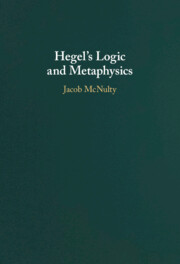Book contents
- Hegel’s Logic and Metaphysics
- Hegel’s Logic and Metaphysics
- Copyright page
- Dedication
- Contents
- Preface
- Acknowledgments
- Abbreviations
- Introduction
- Chapter 1 “Irrational Cognition of the Rational”
- Chapter 2 The Ontological Proof as “the True Critique of the Categories and of Reason”
- Chapter 3 Hegel’s Critique of “the Former Metaphysics”
- Chapter 4 Hegel’s Response to Kant’s Critique of Metaphysics
- Chapter 5 Logical Contradiction and Real Opposition
- Chapter 6 Mediated Immediacy: Concept, Judgment and Syllogism
- Chapter 7 Conclusion
- Works Cited
- Index
Chapter 5 - Logical Contradiction and Real Opposition
Hegel on the Laws of Logic
Published online by Cambridge University Press: 26 April 2023
- Hegel’s Logic and Metaphysics
- Hegel’s Logic and Metaphysics
- Copyright page
- Dedication
- Contents
- Preface
- Acknowledgments
- Abbreviations
- Introduction
- Chapter 1 “Irrational Cognition of the Rational”
- Chapter 2 The Ontological Proof as “the True Critique of the Categories and of Reason”
- Chapter 3 Hegel’s Critique of “the Former Metaphysics”
- Chapter 4 Hegel’s Response to Kant’s Critique of Metaphysics
- Chapter 5 Logical Contradiction and Real Opposition
- Chapter 6 Mediated Immediacy: Concept, Judgment and Syllogism
- Chapter 7 Conclusion
- Works Cited
- Index
Summary
This chapter considers Hegel's treatment of the laws of thought from traditional logic: identity, noncontradiction, excluded middle, even perhaps the principle of sufficient reason (ground). It argues that these laws, which are uncritically presupposed by the tradition, are systematically derived by Hegel. Hegel is able to conduct this derivation because he grasps the deeper ontological import of these laws, that is the way in which the subject matter of logic (negation, affirmation, proposition and so on) can be traced back to a more primordial ontological foundation (nothingness, being, essence). I join others, like Priest, who consider Hegel a dialetheist, but supplement this view. I do so with an account of Hegel as responding to a different paradoxes than the ones that concern contemporary dialetheists. The paradox concerns the notion of identity, which can only relate what is already different. It was one noted by Russell and Wittgenstein after Hegel but not resolved by them in the same way he proposes.
- Type
- Chapter
- Information
- Hegel's Logic and Metaphysics , pp. 166 - 201Publisher: Cambridge University PressPrint publication year: 2023



